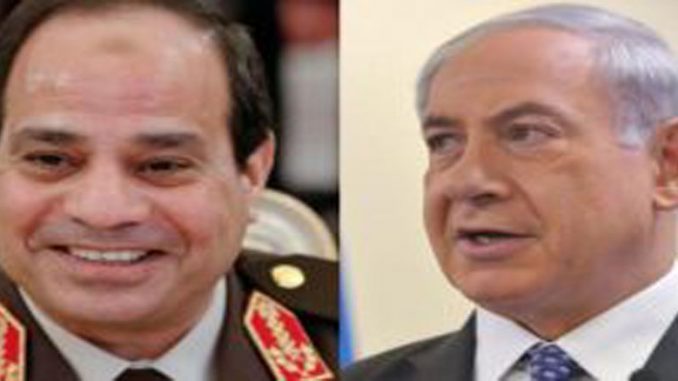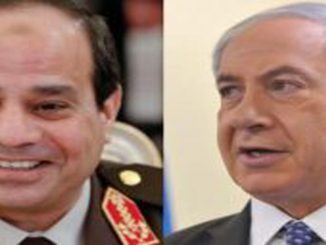
In remarks at the start of his weekly cabinet meeting Sunday, Israeli Prime Minister Benjamin Netanyahu expressed “anger and frustration” over the U.N. Security Council resolution condemning Israeli settlements in the West Bank.
Roi Kais, Yediot Aharonot’s Arab affairs editor, has written on his Twitter account ,”Here’s the paradox: On Friday, Al-Sisi was the ‘King’ of Israel, for preventing the vote in the Security Council. On Saturday, the Egyptian ambassador was summoned for reprimand.”
Kais expressed his astonishment at the decision of Israeli Prime Minister Benjamin Netanyahu of summoning the ambassadors of of all UN security council members which backed a resolution condemning Israeli settlements to “personally reprimand” them over the UN resolution, including the Egyptian ambassador in Israel, Hazem Khairat.
.png)
Benjamin Netanyahu has summoned the ambassadors of all UN security council members which backed a resolution condemning Israeli settlements to “personally reprimand” them.
According to Israeli media reports the ambassadors summoned on Sunday for the Israeli prime minister’s dressing down include all those from security council members with permanent missions in Israel: Russia, China, Japan, Ukraine, France, Britain, Angola, Egypt, Uruguay and Spain.
The resolution, which passed on Friday with 14 votes in support and only the US abstaining, condemned Jewish settlements in the occupied Palestinian territories as constituting a flagrant violation of international law.
It also demanded that states “distinguish, in their relevant dealings, between the territory of the state of Israel and the territories occupied since 1967”.
Netanyahu also accused the US president, Barack Obama, of directly coordinating the resolution at the morning cabinet meeting. “We have no doubt that the Obama administration initiated it, stood behind it, coordinated its versions and insisted upon its passage,” he said. Washington has denied this.
The rebuke came as Israel continued to retaliate against countries that supported the motion, cutting aid to Senegal, cancelling forthcoming official visits – including by the Ukrainian prime minister – and recalling two of its ambassadors, according to The Guardian.
Netanyahu also ordered the Israeli foreign ministry to “re-evaluate all of our ties to the UN within a month”.
Netanyahu is under renewed political pressure to bring forward controversial legislation to legalise dozens of currently illegal outposts in the occupied Palestinian territories.
Significantly, the US ambassador was not summoned, despite the Obama administration’s decision not to veto the resolution – an abstention described by Netanyahu as an “underhanded and anti-Israel manoeuvre”.
Later on Sunday, however, the US state department said its ambassador would meet the Israeli prime minister.
“We can confirm Ambassador Shapiro will meet with PM Netanyahu this evening,” the state department said in a brief statement to Agence France-Presse.
A senior diplomat quoted by the Haaretz newspaper suggested irritation in the diplomatic community with Netanyahu’s Christmas Day summons. “What would they have said in Jerusalem if we summoned the Israeli ambassador on Yom Kippur?” the diplomat told the paper.
The ambassadors’ dressing-down comes amid mounting criticism of Netanyahu from Israeli politicians and the media. Some prominent columnists have blamed Netanyahu’s poor relationship with Obama and his prioritisation of Jewish settlers for the UN resolution.
Israel has continued to condemn Obama and Friday’s resolution, which demanded a halt to settlements in Palestinian territory – the first UN resolution since 1979 to condemn Israel over its settlement policy.
By deciding not to use its veto, the US deeply angered Israel, which has accused Obama of abandoning its closest Middle East ally in the waning days of his administration.
The text was passed with support from all other members of the 15-member security council. Applause broke out in the chamber when the vote results were read out.
The landmark vote came despite intense lobbying by Israel and calls from the US president-elect, Donald Trump, to block the text.
While the resolution contains no sanctions, Israeli officials are concerned it could widen the possibility of prosecution at the international criminal court. They are also worried it could encourage some countries to impose sanctions against Israeli settlers and goods produced in the settlements.
Netanyahu called the resolution a “shameful blow against Israel at the United Nations”.
“The decision that was taken was biased and shameful, but we will withstand it,” the Israeli leader said on Saturday evening. “It will take time, but this decision will be annulled.”
Singling out New Zealand and Senegal, he added: “Two countries with which we have diplomatic relations co-sponsored the resolution against us at the UN; therefore, I ordered yesterday that our ambassadors be recalled from Senegal and from New Zealand. I have ordered that all Israeli assistance to Senegal be halted, and there’s more to come.
“Those who work with us will benefit because Israel has much to give to the countries of the world. But those who work against us will lose – because there will be a diplomatic and economic price for their actions against Israel.”
Netanyahu said Obama had broken a longstanding US commitment not to “dictate the terms of peace to Israel” at the UN. The resolution, Netanyahu said, was “part of the swansong of the old world that is biased against Israel, but, my friends, we are entering a new era”, referring to Trump’s imminent presidency.
Trump reacted after the vote by promising change at the UN. “As to the UN, things will be different after Jan 20th,” he tweeted, referring to the date of his inauguration.
“The big loss yesterday for Israel in the United Nations will make it much harder to negotiate peace. Too bad, but we will get it done anyway!” Trump tweeted later.
The US has traditionally served as Israel’s diplomatic shield, protecting it from resolutions that Israel opposes. It is Israel’s most important ally, providing it with more than $3bn (£3.1bn) a year in defence aid. That number will soon rise to $3.8bn per year under a new decade-long pact – the biggest pledge of US military aid in history.
The Obama administration has grown increasingly frustrated with settlement building in the West Bank, which Israel has occupied for nearly 50 years. There have been growing warnings that settlement expansion is fast eroding the possibility of a two-state solution to the Israeli-Palestinian conflict, the basis of years of negotiations.
Settlements are built on land the Palestinians view as part of their future state and seen as illegal under international law.
“We cannot stand in the way of this resolution as we seek to preserve a chance of attaining our longstanding objective of two states living side by side in peace and security,” said Samantha Power, the US ambassador to the UN. “The settlement problem has gotten so much worse that it is now putting at risk the very viability of that two-state solution.”
After the vote, Israel’s justice minister, Ayelet Shaked, of the far-right Jewish Home said Israel needed “to talk about annexation” of the West Bank.
About 430,000 Israeli settlers currently live in the West Bank, and a further 200,000 Israelis live in annexed East Jerusalem, which Palestinians see as the capital of their future state.



